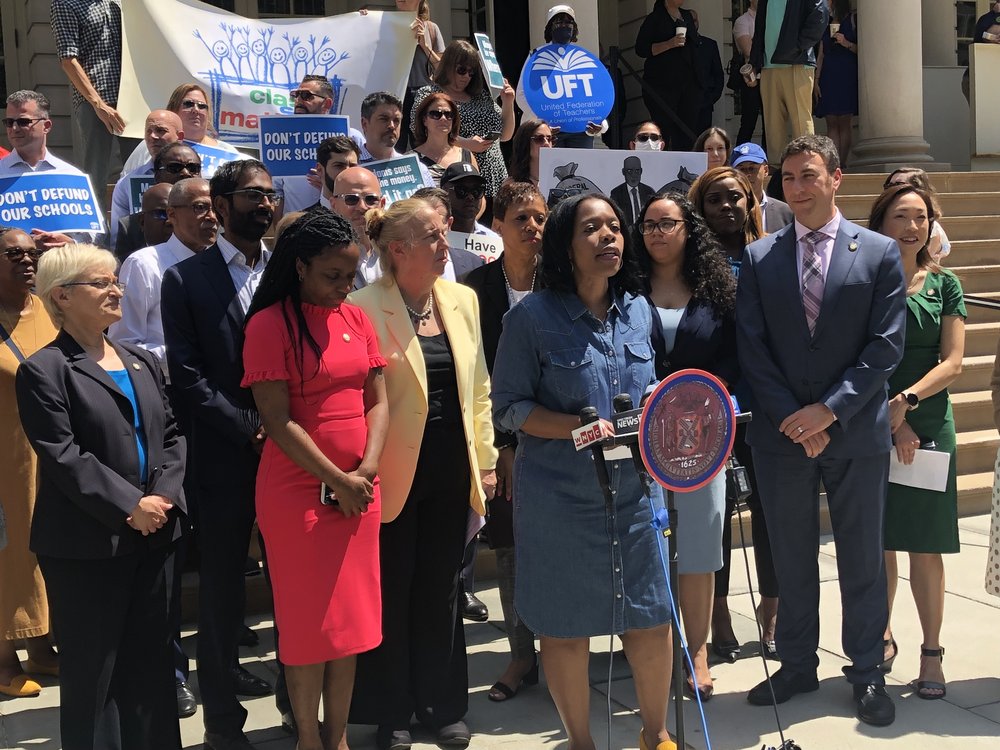At hearing, Council members decry funding cuts to public schools, demanding city restore $215 million
June 24, 2022, 5:10 p.m.
Members of the City Council say they didn’t expect the cuts included in the budget they passed this month to be as damaging to schools as some principals have reported.

Following outrage among parents and educators over cuts to the city’s education budget, New York City Council members are calling on the education department to restore $215 million in funding that’s resulted in cuts to many school budgets.
Council members joined teachers’ union officials and education advocates on the steps of City Hall Friday morning to decry the cuts.
“The DOE has the power to stop this,” said Councilmember Rita Joseph, a former teacher who represents a swath of Central Brooklyn that covers Prospect-Lefferts, Kensington, Flatbush and South Crown Heights, and chairs the council’s education committee. “DOE leadership has talked a lot about the need to restore faith in our public schools and increase enrollment. Well guess what? If schools lose funding, students are going to leave.”
At a City Council hearing following the rally Friday afternoon, education department officials defended the funding reductions, which are tied to sinking enrollment; they pointed to the fact that the changes that are part of the new $101 budget the Council passed – and celebrated – earlier this month. To restore the money to schools that have lost enrollment, officials said, other programs, such as the expansion of 3K, will have to shrink.
Plans to cut $215 million from schools with declining rosters surfaced back in February as part of the mayor’s proposed budget. The city’s public school system is down some 180,000 students from a recent peak of roughly 1.1 million – a trend that began prior to 2020 but was accelerated by the pandemic, with families leaving the city or choosing charter and parochial schools over the public education system.
DOE leadership has talked a lot about the need to restore faith in our public schools and increase enrollment. Well guess what? If schools lose funding, students are going to leave.
Brooklyn Councilmember Rita Joseph
The Council negotiated the budget with the administration throughout the spring. Lawmakers said concern about school funding caused those negotiations to stall for a period before a deal was struck earlier this month. The Council allocated an additional $700 million to the education department, which now has a budget that tops $31 billion (it’s the department with the biggest budget) but the cuts based on enrollment remained.
“That was the one issue that had not been really settled and we were not happy,” said Manhattan Councilmember Gale Brewer, who was on the Council’s budget negotiating team. She said the education department had not been transparent about how the funding decrease would affect schools.
“I wasn’t aware that it would produce this insanity of so many layoffs and so many excesses,” she said. “We didn’t have all the facts that we needed. We will get them.”
At the Council hearing Friday, some lawmakers called on Mayor Eric Adams’ administration to reallocate money so that teachers will not have to be excessed – essentially released from their schools and entered into a pool to be hired for other positions – decisions that principals at some schools have already been forced to make in response to the cuts.
Education department officials testified that they had been forthright about the plan to reduce funds for months, and that shifting personnel is typical.
“We're not saying it's a good thing that schools are seeing their enrollment decline, we're just dealing with the reality,” first deputy chancellor Dan Weisberg said.
He added that he expected most excessed teachers will be hired at schools where enrollment is up, or where there are openings. He said principals will also have a chance to request more money from the school system if they believe their enrollment exceeds the education department’s projections, and that teachers will be able to stay at those schools if additional funding is granted.
But many parents and educators have argued that, given the academic and social-emotional challenges of the pandemic, now is not the time to take any resources away from students. They also say it’s not necessary, given that the city is still sitting on a large chunk of federal stimulus funding.
At the hearing, education officials testified that the city still has some $3.5 billion in stimulus funds available for schools.
But Lindsey Oates, chief financial officer for the education department, said schools need to start weaning off the stimulus funds, or they’ll face even more precipitous cuts when those funds run out. “Unfortunately, the federal stimulus is not permanent and we need to be strategic and fiscally responsible,” she said.
Unfortunately, the federal stimulus is not permanent and we need to be strategic and fiscally responsible.
Lindsey Oates, chief education department's chief financial officer
For the past two years the city has used stimulus money to keep funding for schools steady despite enrollment declines. And it will continue to use federal funds to phase in enrollment-based cuts over two years.
Still, principals say the budgets they’ve received this year have forced them to cut subject-based and special education teachers, arts instructors and enrichment.
Brewer said she has never heard this “kind of panic” from principals before.
“What I’m saying is you’ve got to find $215 million,” she said. “You’ve got to find it.”